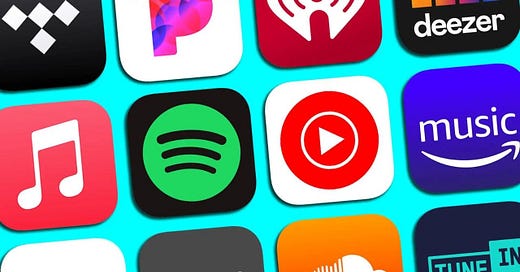Your Emotional Data For Sale | How Music Platforms Monetize Your Mental State 💰🤫
The soundtrack to surveillance capitalism has never sounded so personal
PICTURE THIS 🙌🏻
It's 2 AM, and you're scrolling through Spotify after a brutal breakup, gravitating toward melancholy indie tracks that match your current emotional wreckage. What you don't realize is that every song choice, every skip, every replay is being meticulously catalogued, analyzed, and packaged into an emotional profile that's worth its weight in advertising gold.
🚨 Welcome to the new frontier of digital surveillance where your heartbreak becomes someone else's business opportunity.The Mood Mining Machine
Music streaming platforms have evolved far beyond simple song repositories. They have become sophisticated emotion-harvesting operations that can decode your mental state with startling accuracy. Research consistently shows that the vast majority of listeners use music for emotion regulation, making these platforms intimate windows into our psychological landscapes.
Spotify, with its 675 million global users as of 2024, leads this emotional data revolution. The platform doesn't just track what you listen to; it analyzes when you listen, how long you engage with certain tracks, and which emotions those choices reveal. Every playlist titled "sad boi hours" or "Monday motivation" becomes a data point in your emotional blueprint.
The company has even secured patents for emotional surveillance technology, demonstrating their commitment to mining the deepest layers of user psychology. This isn't accidental but the calculated monetization of human vulnerability.
The Algorithm Knows You Better Than You Know Yourself
Modern music recommendation systems use advanced AI models that can predict emotional states from musical preferences with remarkable precision. Platforms like Natsukashii demonstrate how audio features from recent playlist selections can provide "heartfelt insight into users' current mood," creating what researchers call "personalized sentiment analysis."
These systems employ Russell's Circumplex Model of Affect, which maps emotions across two dimensions: Valence (positive/negative) and Arousal (intensity).
By analyzing tempo, key signatures, lyrical content, and listening patterns, AI can determine whether you are anxious, depressed, euphoric, or anywhere in between.
The technology has become incredibly sophisticated, with emotion detection from facial expressions achieving over 90% accuracy in controlled settings (A Literature Review on Face Emotions Based Music Player, IJIRSET, May 2024), and AI systems demonstrating strong predictive capabilities for advertisement effectiveness.
This creates a feedback loop where platforms not only understand your emotional state but can influence it through carefully curated musical experiences.
The Monetization Playbook
Precision Advertising Through Emotional Targeting
Music platforms have discovered that emotional data is advertising gold. Spotify uses its emotional intelligence for "precise ad targeting," serving personalized advertisements based on users' specific interests and emotional habits.
If you frequently listen to fitness playlists, expect gym membership ads.
If your midnight listening skews melancholic, prepare for therapy app promotions or comfort food advertisements.
This targeting works because emotional states make consumers more susceptible to specific types of messaging.
Research demonstrates that positive expressions, especially when elicited just before showing a brand, correlate with increased advertising effectiveness.
Platforms can literally time their advertisements to moments of maximum emotional vulnerability.
Data Monetization Through Engagement
The emotional profiles created from your listening habits become valuable commodities. Spotify has been labelled a "Big Mood Machine" that stores "copious amounts of data on our moods based on the music we choose to stream, and then uses the data for targeted advertising and profit".
This positioning as a "surveillance capitalist firm" suggests the company aims to "capitalize on users' data to control their behaviour, promote paid subscriptions, and deliver targeted ads".
The Wrapped Phenomenon
Spotify's annual "Wrapped" campaign exemplifies this emotional monetization strategy. While users celebrate their personalized musical journey, they are actually participating in a massive data harvesting operation disguised as entertainment. The #SpotifyWrapped2024 hashtag reached 400 million views on TikTok within just three days, with users voluntarily sharing intimate details about their emotional lives while generating free marketing for the platform.
This campaign also drives a 40% increase in in-app activity during its launch week, demonstrating how emotional data visualization can manipulate user behaviour for commercial gain.
The Manipulation Engine
Perhaps most concerning is how platforms use emotional data to actively manipulate user experiences. AI tools can now "manipulate the emotional content of a song" to achieve "desired emotions while leaving the original melody as intact as possible."
This technology enables platforms to subtly shift users' emotional states to maximize engagement and advertising susceptibility.Emotion-Based Music Recommendation Systems (EMRS) can detect feelings through facial expressions, voice tone, and physiological signals like heart rate, then provide music that aligns with or helps to enhance the detected emotion. While marketed as enhancing user experience, this capability raises serious questions about consent and manipulation.
Research into "emotion trajectories" reveals that AI can track emotional responses frame by frame, building detailed maps of how specific musical elements trigger psychological responses. This granular understanding enables platforms to craft experiences that keep users engaged longer and more susceptible to targeted messaging.
The Privacy Paradox
Despite growing awareness of these practices, user acceptance remains surprisingly high. Although, studies indicate that while many users are receptive to emotional personalization features, a significant majority favour the ability to deactivate such capabilities. This suggests users want emotional personalization but also desire control over their data.
The ethical implications are staggering.
Emotion regulation plugins raise concerns about JUSTICE (unequal access), IDENTITY (influence on personality), and AUTONOMY (manipulation of user decision-making).
When platforms can detect vulnerability through music choices, they gain unprecedented power to exploit emotional states for commercial gain.
The Mental Health Marketplace
Companies are increasingly positioning emotional music platforms as wellness tools, blurring the lines between entertainment and therapy. Platforms like FaceTune.ai analyze "real-time emotions to curate personalized soundtracks" for "relaxation, focus, or motivation," claiming to "enhance emotional well-being". This positioning allows companies to collect even more sensitive psychological data under the guise of mental health support.
The integration of emotion detection with music recommendation creates systems that can provide "music that fits those emotions" in real-time, essentially turning streaming platforms into unlicensed mood regulation services with commercial interests.
Taking Back Control
The commodification of our emotional lives through music platforms represents a fundamental threat to human autonomy.
When companies can predict, influence, and monetize our feelings, we lose something essential about our relationship with music and ourselves.
Moving forward, we need:
Transparent emotional data policies that clearly explain how psychological insights are collected and used
Granular privacy controls allowing users to opt-out of emotional tracking without losing service functionality
Regulatory frameworks that treat emotional data as sensitive health information requiring special protection
Alternative platforms that prioritize user privacy over profit maximization
Conclusion | The Sound of Surveillance
The next time you open your music app, remember:
You are not just choosing a soundtrack; you're potentially feeding a machine designed to UNDERSTAND, PREDICT, and PROFIT from your deepest emotional states.Your mental health data is valuable, and it's time to demand better protection for something so fundamentally human.
The patents exist. The technology is deployed. The monetization is happening.
The only question is whether we will demand better before these systems become even more sophisticated at exploiting our most vulnerable moments.
🫵🏼 What emotional data are YOU comfortable sharing with your music platform?
💬 Share your thoughts on digital privacy and music in the comments below.
👉🏼 Subscribe for more investigations into how technology companies monetize our most intimate data. Understanding these hidden systems may be crucial for protecting both your privacy and your mental health in the digital age.
🤝🏼 Join us at Vinyl Culture as we continue exploring ways to preserve and evolve an authentic music culture in an age dominated by algorithms and corporate interests.
5️⃣0️⃣0️⃣+ SUBSCRIBERS have now joined our mission to protect The Soul of Music in the age of algorithmic manipulation & AI. Thanks a lot to each & every one of you!! 🫵🏼 🤝🏼🙌🏻 Together, we can make a difference.












Excellent post. It is very alarming. Thank you for bringing it up.